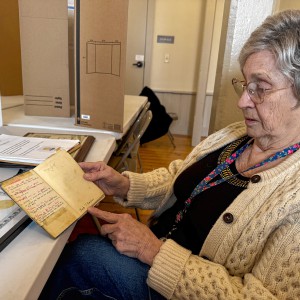Northampton school spending advocates eye ‘mountain of cash’ in reserves; city officials warn of slippery slope

During a special Northampton City Council meeting on Monday held virtually, Northampton resident and former Windsor, Conn., deputy mayor Al Simon, left, and Ward 3 Councilor Quaverly Rothenberg speak from inside the chapel room of First Churches of Northampton in support of raising the school budget to prevent job cuts. STAFF PHOTO/ALEXANDER MACDOUGALL
|
Published: 06-18-2024 8:29 PM
Modified: 06-19-2024 12:51 PM |
NORTHAMPTON — With more than 50 supporters of a larger budget for Northampton Public Schools sitting behind her, Ward 3 City Councilor Quaverly Rothenberg attempted to explain to her fellow councilors Monday night how the city can fully fund the school budget and in the process prevent job cuts that are currently on the table in the city’s latest budget iteration.
“[The schools] have been paid with bits and pieces and odds and ends, and almost treated like an ugly stepchild in our budget,” Rothenberg told the council at a special council meeting.
“As far as I can tell, from emails I’ve received and constituents I’ve spoken with, the city feels that school funding is a major priority for Northampton. This is a core value to our constituents.”
Rothenberg logged into the virtual-only meeting from the chapel room of First Churches of Northampton, a space large enough to accommodate teachers, students, and other supporters of a “level-services” budget, or one that would prevent any job cuts to the district, who wanted to attend in person.
The meeting occurred just three days before the council’s expected vote Thursday on the city’s $137 million fiscal 2025 budget.
Nearly all of the budget discussion leading up to this week’s vote has been taken up by school funding.
As proposed, the school budget for next fiscal year would be $40 million. That’s $2 million more, or about 8%, than the current year, but $2.5 million short of the level-services budget that would mean no layoffs next year.
A level-services budget would require a 14% increase over the current year’s spending. Under the current plan, 20 full-time positions would be cut.
Article continues after...
Yesterday's Most Read Articles
Rothenberg was joined in her presentation by Joanne Morgan, a first grade teacher at Bridge Street Elementary School; Kate Fontaine, a coordinator for the district’s Northampton Association of School Employees union; and Al Simon, a Northampton resident who formerly served on the City Council and as deputy mayor for the city of Windsor, Connecticut, which has a population roughly equal to that of Northampton.
Simon, who presented several slides with statistics from the Massachusetts Division of Local Services, claimed the city was sitting on a “mountain of cash” that could be used to fund the school district.
“The status of Northampton actually is exactly the opposite of deficit. It is surplus, surplus, surplus, surplus,” Simon said. “This surplus is certified by the state of Massachusetts and our independent auditors. And I have every reason to believe that is correct.”
The state figures show that Northampton had the ninth-highest total stabilization funds balance of the state’s 351 municipalities, with a balance of $33 million. It also had the 15th-highest stabilization fund balance as a percentage of the budget, at nearly 30%, and the highest in the state where the budget exceeded $100 million. Stabilization funds essentially act as savings accounts for cities and towns in the state, and municipalities are allowed to use them for any lawful purpose they so choose.
“That is astounding that there is that much cash in a town of this size,” Simon said of Northampton’s stabilization fund numbers. “What it looks like to me is the [city’s] stability plan has had a priority to generate cash. It’s done it very, very successfully. Unfortunately, the stability plan is not providing sufficient recurring funds to the Northampton Public Schools.”
In an interview on Tuesday, Mayor Gina-Louise Sciarra, who attended Monday’s meeting, said there were other projects in the city that the stabilization funds had to account for, citing urgent repairs needed for Memorial Hall and a recent boiler replacement as Forbes Library as also requiring cash from the city’s reserves.
“It took years of building up these reserves to be able to have a stable capital plan where we can start tackling some of these things,” Sciarra said. “I feel like it sort of is incorrectly implied that we have all of these reserves but sort of no plan for them. ... We have these reserves and stabilization funds, but we have planned careful uses for them and we have policies that go around them.”
Sciarra also said the city follows recommendations from the state Division of Local Services on how much money it should keep in its reserves.
“I’m not sure of anywhere where you would have a successful government who just can decide that they’re going to raise things as much as they aspirationally want every year,” Sciarra said.
“Everyone has to work within some kind of parameters of what revenue can be raised in a year.”
Charlene Nardi, the city’s finance director, also pushed back against the idea that the city had a budget surplus.
“Using your reserves or having reserves doesn’t take away from the fact that there’s still a shortfall,” Nardi told the Gazette. “Regardless of how you’re covering it with short-time money, one-time money is still a shortfall and it’s growing each year. That’s why our definition is there, (that it) is an operational budget shortfall or deficit.”
Nardi also said the DLS figures cited by Simon, which are from a previous fiscal year, include money not in the stabilization funds such as overlays to make up for tax exemptions and such things as property tax abatements, as well as free cash reserves.
The total amount across the city’s four stabilization funds, Nardi said, is closer to $18 million. She said that if the city passed a level-services school budget, it would run out of stabilization funds in two years.
“What we’re saying is we can’t use as much reserves as they would like because it is not sustainable,” Nardi said.
Rothenberg also laid out several suggestions for how the city could improve its budgeting process for schools in a slide presentation titled “A Map to Responsive and Responsible Budgeting.” The suggestions include creating a Budget and Fiscal Oversight Committee to determine each year’s target amounts for reserve funds, establishing specific and clear goals for the school budget each year, and establishing annual operational audits of selected city departments.
Following the presentation, Rothenberg was asked a series of questions by city councilors, some of whom were particularly pointed in their inquiries. Ward 2 Councilor Deb Pastrich-Klemer asked Rothenberg if she had any experience in finance before becoming a councilor.
Rothenberg responded that she had not, having worked as a classical musician and court stenographer before joining the council, but that she had spoken with people at the Department of Revenue, along with the independent auditor for the city and with Simon about the budget.
“When I learn new things, I learn from masters. And that is what I have done as a city councilor, is to talk to the DOR as much as I can,” Rothenberg responded. “I appreciate the expertise that Simon has brought, and I would love to learn even more from Director Nardi.”
Councilor-at-large Marissa Elkins asked how the city in subsequent years would continue to sustain the school budget after such a drastic increase this year. Rothenberg said that once an appropriate amount from stabilization funds was rolled into the school budget on a regular basis, that budget would then revert to growing at an average annual percentage of 3% to 4% next fiscal year.
“We are suggesting that through the use of operational audits, getting community input, setting a free cash reserve target, that will make your budget bigger,” Rothenberg said. “You just need to get over that hurdle of getting them in there to begin with.”
Nardi told the Gazette that if the level-services budget were to pass, a conservative estimate would put the expected growth of the school budget for next fiscal year at a 4.24%, a percentage consistent with previous years. However, the size of the school budget would mean an increase of that percentage totaling $1.8 million, out of an expected $3 million in revenue for next year.
Though the question-and-answer period had Rothenberg’s audio muted except for when she was answering a question, it didn’t stop the audience in the chapel room from being vocal in their approval or disapproval of statements made. Whenever somebody on the Zoom meeting mentioned the word “deficit,” for example, the chapel room was filled with yells of “there is no deficit!” Many of Rothenberg and Simon’s statements were also met with applause after they had finished speaking.
The council is expected to vote on the budget at when it meets at 6:30 p.m. Thursday. Flyers handed out at the chapel room stated that the Western Massachusetts Area Labor Federation plans to announce that day a new coalition of unions, students, parents and community groups “to ensure our schools are fully funded.”
Alexander MacDougall can be reached at amacdougall@gazettenet.com.






 Sabadosa, Velis push for state endometriosis task force to raise awareness about little-known illness
Sabadosa, Velis push for state endometriosis task force to raise awareness about little-known illness  Around the Hamptons: Four candidates advance for Easthampton police chief
Around the Hamptons: Four candidates advance for Easthampton police chief Having adapted over time, Whately Grange celebrating 85 years
Having adapted over time, Whately Grange celebrating 85 years Dash to the dealership?: Local consumers, car sellers brace for auto tariffs to kick in Wednesday
Dash to the dealership?: Local consumers, car sellers brace for auto tariffs to kick in Wednesday
